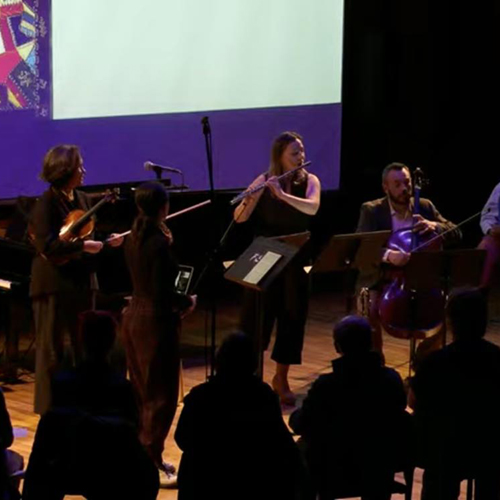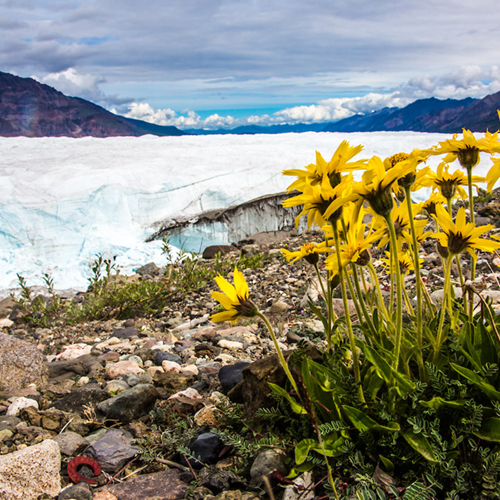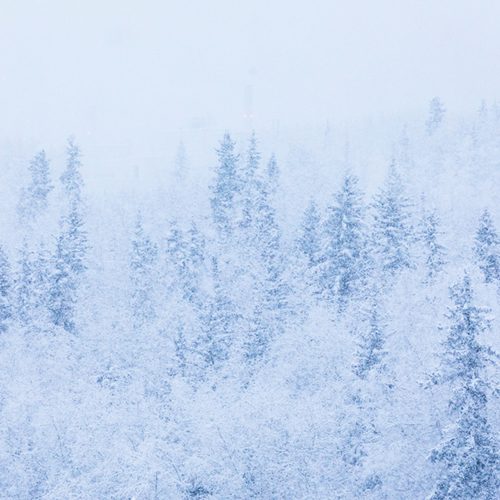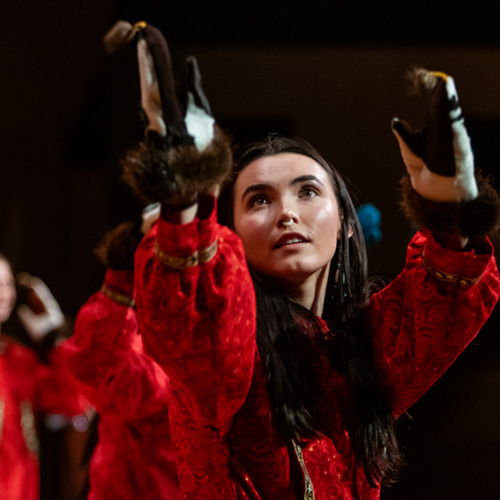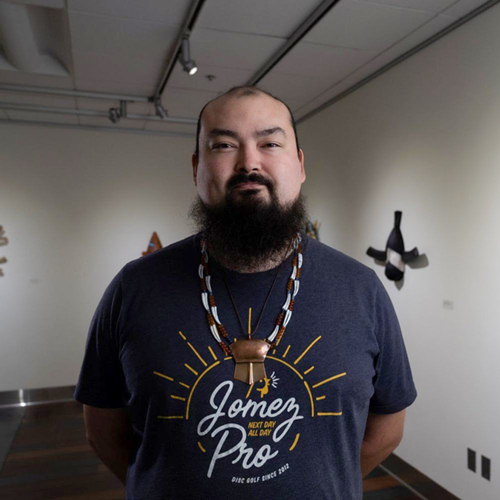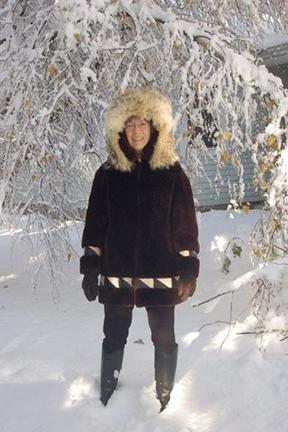Circumpolar Music Series
The Circumpolar Music Series is a new initiative led by the UAF Department of Music beginning in 2022. CMS will annually showcase artists, scholars, and musicians who identify with the circumpolar region of the world. Through performances, lectures, and hands-on activities, distinct features of northern art and music will be shared and explored. The UAF Department of Music is grateful to its generous benefactor, Catherine Madsen for her support of the Circumpolar Music Series.
Upcoming Events
Join us for upcoming performances, demonstrations, and presentations showcasing the rich musical traditions of the circumpolar north.
Wild Shore New Music celebrates 11 seasons in Alaska with performances by Dr. Heidi Aklaseaq Senungetuk and Alaskan musicians, premiering "For Zitkála-Šá Series" by Raven Chacon.
Three Juneau-based composers—Todd Hunt, Beth Leibowitz, and Michael Bucy—will premiere climate-inspired works in Fairbanks, collaborating with UAF scientists and local musicians.
Asikłuk Topkok and the Pavva Iñupiaq Dancers present Iñupiaq culture through song and dance, sharing traditions that preserve and celebrate Alaska Native heritage and identity.
Brian Walker II, an Inupiat and Deg Hit’an mask maker, presents a talk on Alaska Native music, drum making, culture, and artistic traditions. **Rescheduled from March 4th**
Articles
Dive into the unique melodies of the circumpolar north with our archive of Arctic music articles.

Craig Coray's We Walk to the Sky for Chamber Ensemble
March 28, 2025
Explore Craig Coray's We Walk to the Sky, a chamber work inspired by Dena'ina culture, Alaskan landscapes, and the transformative power of sound.

February 27, 2025
Discover Scotland's rich musical traditions through its circumpolar connection, from Gaelic psalms to Shetland fiddle tunes and ancient Nordic influences.

January 27, 2025
Discover the heartbeat of life through drumming traditions from the Arctic. Explore its meditative power, cultural significance, and unique styles globally.

December 28, 2024
Explore the vibrant Orthodox tradition of Selaviq in Western Alaska, blending Ukrainian roots with Yup'ik customs through songs, feasts, and community.

Norwegian Stev: The World in Four Lines
November 26, 2024
Discover stev, traditional Norwegian songs from Setesdal and Øvre Telemark, blending poetic wit, modal melodies, and cultural heritage dating back centuries.

Modern Alaska Native Dance Festivals
October 28, 2024
Alaska Native people have long celebrated music and dance as deep spiritual practices, uniting diverse cultures and languages across the region.

The Circumpolar Music Series Has Begun!
October 26, 2024
The Circumpolar Music Series launched with Fairbanks Flutists, Wildshore New Music, and Dr. Heidi Senungetuk in an intimate concert featuring unique indigenous-inspired works.

Circumpolar Music Series 2024-2025 Season Announcement!
September 27, 2024
Join us for the 2024-2025 Circumpolar Music Series opener on Oct 18 at Davis Concert Hall, featuring Dr. Senungetuk and Wild Shore New Music.

When Traditional Music Leaves Home
August 31, 2024
Ethnomusicology uncovers music's deep cultural roots, revealing how it evolves while preserving authenticity and reflecting enduring human experiences.

May 01, 2024
Who would suppose, in this age of large-scale dairy farms and robotic milking machines, that the way to bring your cows home is to lure them with beauty? That's what traditional Scandinavian farm women did from time out of mind, in high-pitched melodic phrases known as kulning.
About the Benefactor
Catherine Madsen
Several years ago I encountered the Yup’ik phrase “When I first became aware.” Immediately I thought, “That was what happened to me in Fairbanks.” I was ten years old when my family moved there, in 1962—my father had taken a job in the English Department—so I had been conscious of myself and my surroundings for quite a while, but in Fairbanks I became aware in a different way that things mattered. Alaska makes its people rise to an occasion; it makes them want to be worthy of it. Among my classmates I’m sure I was an insufferable preadolescent faculty brat, but alone on the trails I was discovering I had a soul.
We lived there for only three years, and all I wanted in the world was to live there again, but by the time I muddled my way into knowing how to make a living I had personal commitments that made that impossible. I shared the memory of Alaska with my parents, but (as Gimli says in The Lord of the Rings) memory is not what the heart desires. What I wanted was a way of belonging to Fairbanks in real time—a way of going there as something other than a tourist. While working at a nonprofit in Massachusetts I discovered that donors were often interesting and imaginative people, who supported the institution not only with money but with intellectual energy; when I got old enough to have (to my astonishment) a bit more money than I needed, I started wondering whether I could do something with it at UAF. It’s one thing to care about a place quietly and privately and painfully; it’s another to make something original happen there.
I didn’t know at first that it would be through music. Folk music has always been part of my life, both as a listener and as a performer, but primarily I’m a writer and could have gone in almost any direction. While looking through the UAF website I thought the most exciting programs and courses were those on circumpolar science and technology, circumpolar history, circumpolar ethnography, circumpolar law and policy, circumpolar art and culture—but there was a gap when it came to music. What I wanted to support, I realized, was circumpolar ethnomusicology—from the local wealth of Alaska Native music and dance to the undiscovered realms of indigenous and folk music across the circumpolar North. I especially wanted to introduce Fairbanksans to some of the beautiful Scandinavian music I’d found while searching at latitude 42 for music to remind me of latitude 65.
UAF’s Judith Kleinfeld says in Go For It!: Finding Your Own Frontier that if you want to do something in Alaska nobody will stop you. Mrs. Boko of Denali Elementary gave my sixth-grade class the word initiative and expected us to run with it. The Circumpolar Music Series is my response to those opportunities. I hope it will inspire others to explore and support the music of the North.
About the Faculty Organizer
Dr. Sean Dowgray
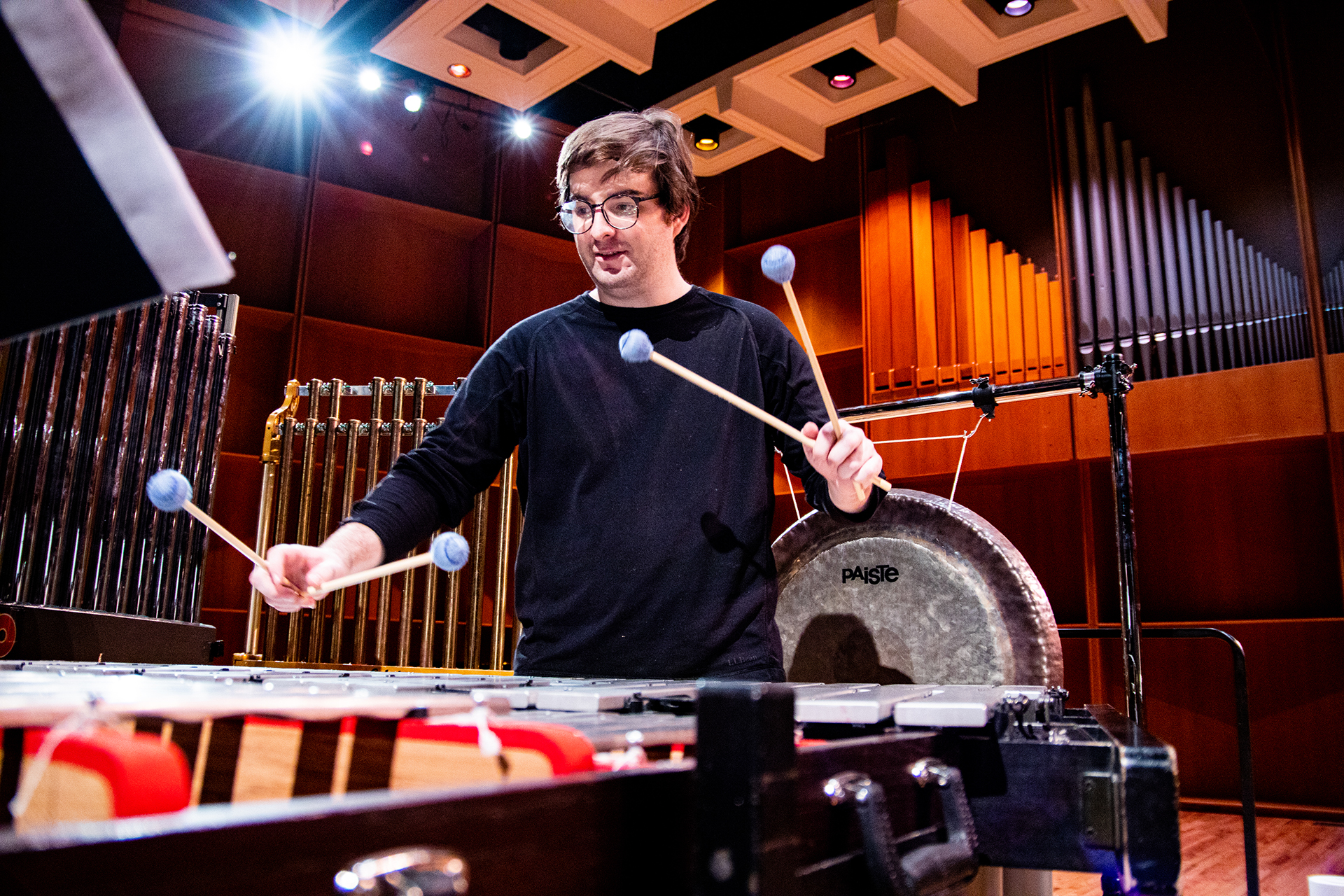 Dr. Sean Dowgray is a classical percussionist specializing in modern and contemporary
music. Dowgray is a proponent of creative collaborations which has resulted in recent
musical works by Daniel Tacke (Vorrücken and einsamkeit), Josh Levine (Shrinking world/expanding and Les yeux ouverts) as well as new chamber works by Justin Murphy-Mancini (Sic itur ad astra and A Song of Grecis.) and Lydia Winsor Brinadmour (As if, sand). In the recent past, Dowgray has collaborated closely with composers including Jürg Frey (Garden of Transparency), Christopher Adler (Strata), Ioannis Mitsialis (Machine Mode), Lewis Nielson (Where Ashes Make the Flowers Grow and NOVA), and James Wood (Cloud Polyphonies).
Dr. Sean Dowgray is a classical percussionist specializing in modern and contemporary
music. Dowgray is a proponent of creative collaborations which has resulted in recent
musical works by Daniel Tacke (Vorrücken and einsamkeit), Josh Levine (Shrinking world/expanding and Les yeux ouverts) as well as new chamber works by Justin Murphy-Mancini (Sic itur ad astra and A Song of Grecis.) and Lydia Winsor Brinadmour (As if, sand). In the recent past, Dowgray has collaborated closely with composers including Jürg Frey (Garden of Transparency), Christopher Adler (Strata), Ioannis Mitsialis (Machine Mode), Lewis Nielson (Where Ashes Make the Flowers Grow and NOVA), and James Wood (Cloud Polyphonies).
As a soloist, Dr. Dowgray has focused extensively on works that stretch the technical and expressive capabilities of both instrument and performer. This includes the work of Jason Eckardt, Josh Levine, Daniel Tacke, Salvatore Sciarrino, Lewis Nielson, David Lang, Christopher Adler, Brian Ferneyhough, Luciano Berio, Richard Barrett. Dowgray has been featured as a soloist at the Oberlin Percussion Institute, the Percussive Art Society International Convention (PASIC), the WasteLAnd New Music Series, Harvard’s Institute for Advanced Learning, the University of Arizona, the SoundON New Music Festival, and Eureka! Musical Minds of California.
As a creative practitioner, Dowgray has focused recently on his project, WHEN for mixed ensemble set to premiere in 2025. He recently completed the interdisciplinary collaboration, In A Time of Change: Boreal Forest Stories featuring artists and scientists. As part of this collaboration, Dowgray created the work Moving Through the Boreal Forest in partnership with Maïté Agopian (light and shadow work) and Daryl Farmer (poetry), Associate Professor of English at UAF.
Dr. Dowgray is a graduate of the Interlochen Arts Academy where he studied with John Alfieri, the Oberlin Conservatory (B.M.) where studied with Michael Rosen, the University of Alaska Fairbanks (M.M.) where he studied with Dr. Morris Palter, and the University of California San Diego (D.M.A) where he studied with Steven Schick. In Dr. Dowgray's dissertation, Time Being: Percussion as a Study of Time, he presents an analyses of new and rarely heard works for and with percussion through theoretical frameworks of time study from authors including Jonathan Kramer, J.T. Fraser, Edward T. Hall, and others.
Recent notable performances include John Corigliano's percussion concerto, Conjurer with the Fairbanks Symphony Orchestra and Lewis Nielson's Lengua Encubierto for solo percussion at the Percussive Arts Society International Convention (PASIC).


